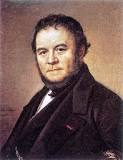The Red and the Black Page #11
Le Rouge et le Noir is a historical psychological novel in two volumes by Stendhal, published in 1830. It chronicles the attempts of a provincial young man to rise socially beyond his modest upbringing through a combination of talent, hard work, deception, and hypocrisy.
"What do you want here, my child." Julien turned round sharply and was so struck by Madame de Rênal's look, full of graciousness as it was, that up to a certain point he forgot to be nervous. Overcome by her beauty he soon forgot everything, even what he had come for. Madame de Rênal repeated her question. "I have come here to be tutor, Madame," he said at last, quite ashamed of his tears which he was drying as best as he could. Madame de Rênal remained silent. They had a view of each other at close range. Julien had never seen a human being so well-dressed, and above all he had never seen a woman with so dazzling a complexion speak to him at all softly. Madame de Rênal observed the big tears which had lingered on the cheeks of the young peasant, those cheeks which had been so pale and were now so pink. Soon she began to laugh with all the mad gaiety of a young girl, she made fun of herself, and was unable to realise the extent of her happiness. So this was that tutor whom she had imagined a dirty, badly dressed priest, who was coming to scold and flog her children. "What! Monsieur," she said to him at last, "you know Latin?" The word "Monsieur" astonished Julien so much that he reflected for a moment. "Yes, Madame," he said timidly. Madame de Rênal was so happy that she plucked up the courage to say to Julien, "You will not scold the poor children too much?" "I scold them!" said Julien in astonishment; "why should I?" "You won't, will you, Monsieur," she added after a little silence, in a soft voice whose emotion became more and more intense. "You will be nice to them, you promise me?" To hear himself called "Monsieur" again in all seriousness by so well dressed a lady was beyond all Julien's expectations. He had always said to himself in all the castles of Spain that he had built in his youth, that no real lady would ever condescend to talk to him except when he had a fine uniform. Madame de Rênal, on her side, was completely taken in by Julien's beautiful complexion, his big black eyes, and his pretty hair, which was more than usually curly, because he had just plunged his head into the basin of the public fountain in order to refresh himself. She was over-joyed to find that this sinister tutor, whom she had feared to find so harsh and severe to her children, had, as a matter of fact, the timid manner of a girl. The contrast between her fears and what she now saw, proved a great event for Madame de Rênal's peaceful temperament. Finally, she recovered from her surprise. She was astonished to find herself at the gate of her own house talking in this way and at such close quarters to this young and somewhat scantily dressed man. "Let us go in, Monsieur," she said to him with a certain air of embarrassment. During Madame de Rênal's whole life she had never been so deeply moved by such a sense of pure pleasure. Never had so gracious a vision followed in the wake of her disconcerting fears. So these pretty children of whom she took such care were not after all to fall into the hands of a dirty grumbling priest. She had scarcely entered the vestibule when she turned round towards Julien, who was following her trembling. His astonishment at the sight of so fine a house proved but an additional charm in Madame de Rênal's eyes. She could not believe her own eyes. It seemed to her, above all, that the tutor ought to have a black suit. "But is it true, Monsieur," she said to him, stopping once again, and in mortal fear that she had made a mistake, so happy had her discovery made her. "Is it true that you know Latin?" These words offended Julien's pride, and dissipated the charming atmosphere which he had been enjoying for the last quarter of an hour. "Yes, Madame," he said, trying to assume an air of coldness, "I know Latin as well as the curé, who has been good enough to say sometimes that I know it even better." Madame de Rênal thought that Julien looked extremely wicked. He had stopped two paces from her. She approached and said to him in a whisper: "You won't beat my children the first few days, will you, even if they do not know their lessons?" The softness and almost supplication of so beautiful a lady made Julien suddenly forget what he owed to his reputation as a Latinist. Madame de Rênal's face was close to his own. He smelt the perfume of a woman's summer clothing, a quite astonishing experience for a poor peasant. Julien blushed extremely, and said with a sigh in a faltering voice: "Fear nothing, Madame, I will obey you in everything." It was only now, when her anxiety about her children had been relieved once and for all, that Madame de Rênal was struck by Julien's extreme beauty. The comparative effeminancy of his features and his air of extreme embarrassment did not seem in any way ridiculous to a woman who was herself extremely timid. The male air, which is usually considered essential to a man's beauty, would have terrified her. "How old are you, sir," she said to Julien. "Nearly nineteen." "My elder son is eleven," went on Madame de Rênal, who had completely recovered her confidence. "He will be almost a chum for you. You will talk sensibly to him. His father started beating him once. The child was ill for a whole week, and yet it was only a little tap." What a difference between him and me, thought Julien. Why, it was only yesterday that my father beat me. How happy these rich people are. Madame de Rênal, who had already begun to observe the fine nuances of the workings in the tutor's mind, took this fit of sadness for timidity and tried to encourage him. "What is your name, Monsieur?" she said to him, with an accent and a graciousness whose charm Julien appreciated without being able to explain. "I am called Julien Sorel, Madame. I feel nervous of entering a strange house for the first time in my life. I have need of your protection and I want you to make many allowances for me during the first few days. I have never been to the college, I was too poor. I have never spoken to anyone else except my cousin who was Surgeon-Major, Member of the Legion of Honour, and M. the curé Chélan. He will give you a good account of me. My brothers always used to beat me, and you must not believe them if they speak badly of me to you. You must forgive my faults, Madame. I shall always mean everything for the best." Julien had regained his confidence during this long speech. He was examining Madame de Rênal. Perfect grace works wonders when it is natural to the character, and above all, when the person whom it adorns never thinks of trying to affect it. Julien, who was quite a connoisseur in feminine beauty, would have sworn at this particular moment that she was not more than twenty. The rash idea of kissing her hand immediately occurred to him. He soon became frightened of his idea. A minute later he said to himself, it will be an act of cowardice if I do not carry out an action which may be useful to me, and lessen the contempt which this fine lady probably has for a poor workman just taken away from the saw-mill. Possibly Julien was a little encouraged through having heard some young girls repeat on Sundays during the last six months the words "pretty boy."
Translation
Translate and read this book in other languages:
Select another language:
- - Select -
- 简体中文 (Chinese - Simplified)
- 繁體中文 (Chinese - Traditional)
- Español (Spanish)
- Esperanto (Esperanto)
- 日本語 (Japanese)
- Português (Portuguese)
- Deutsch (German)
- العربية (Arabic)
- Français (French)
- Русский (Russian)
- ಕನ್ನಡ (Kannada)
- 한국어 (Korean)
- עברית (Hebrew)
- Gaeilge (Irish)
- Українська (Ukrainian)
- اردو (Urdu)
- Magyar (Hungarian)
- मानक हिन्दी (Hindi)
- Indonesia (Indonesian)
- Italiano (Italian)
- தமிழ் (Tamil)
- Türkçe (Turkish)
- తెలుగు (Telugu)
- ภาษาไทย (Thai)
- Tiếng Việt (Vietnamese)
- Čeština (Czech)
- Polski (Polish)
- Bahasa Indonesia (Indonesian)
- Românește (Romanian)
- Nederlands (Dutch)
- Ελληνικά (Greek)
- Latinum (Latin)
- Svenska (Swedish)
- Dansk (Danish)
- Suomi (Finnish)
- فارسی (Persian)
- ייִדיש (Yiddish)
- հայերեն (Armenian)
- Norsk (Norwegian)
- English (English)
Citation
Use the citation below to add this book to your bibliography:
Style:MLAChicagoAPA
"The Red and the Black Books." Literature.com. STANDS4 LLC, 2025. Web. 9 Mar. 2025. <https://www.literature.com/book/the_red_and_the_black_201>.








Discuss this The Red and the Black book with the community:
Report Comment
We're doing our best to make sure our content is useful, accurate and safe.
If by any chance you spot an inappropriate comment while navigating through our website please use this form to let us know, and we'll take care of it shortly.
Attachment
You need to be logged in to favorite.
Log In